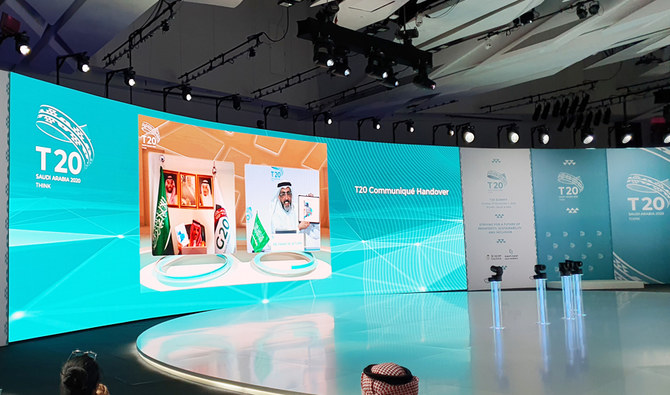JEDDAH: Leaders at the upcoming Saudi-hosted G20 summit will be presented with 32 key policy recommendations developed by 11 Think 20 (T20) task forces led by the Kingdom.
The recommendations were presented during the final day of the Saudi T20 summit as part of a communique.
The communique details innovative policies for consideration during the G20 summit, which will be held virtually in Riyadh due to the coronavirus pandemic.
The T20, dubbed the “ideas bank” of the G20, convened for the summit in Riyadh under the direction of two lead organizations, the King Abdullah Petroleum Studies and Research Center (KAPSARC), and the King Faisal Center for Research and Islamic Studies (KFCRIS).
An initial 10 task forces set out to gather and provide crucial research to the G20 earlier this year, but due to the emergence of the pandemic, an extra group was created to study the impact of the virus.
The new policy recommendations are critical to advancing the T20 Saudi Arabia vision, which strives for a future of prosperity, sustainability and inclusion.
“We’ve kept our promise made in Japan last year to ensure continuity of the process and we’ve added prosperity, sustainability and inclusion,” T20 chair Dr. Fahad Al-Turki told Arab News. “The T20 did not become the voice of G20 member states only, but to non-members as well.
“Our inclusive approach was important as it tackled issues that many non-member states face. Bringing them to the table and making them part of the discussion to come up with the appropriate approaches based on research-based policy recommendations was important. The rigor in which a problem is defined is the most important factor in finding a suitable policy solution, but not all are proficient at articulating these solutions clearly and concisely. The T20 helps address that and ready them for action,” he added.

Discussion over the course of the year drastically accelerated following the emergence of the pandemic. The communique calls for urgent action on issues including global health care, multilateralism and economic development, global inequality, climate and environment and sustainable resources, among others.
Two recurring topics highlighted in the communique were severely affected by the pandemic. The virus outbreak served as another call to embrace the role health care plays in the global economy. The communique urges the G20 to reinforce the importance of health and the need for enhanced resiliency, preparedness and universal medical coverage.
The final report also encourages the G20 to strengthen national health care systems, support primary health care and ensure that comprehensive early childhood education, care and development are essential elements of national strategies. It also urges the World Health Organization to further develop international health regulations that interface with national health measures.
The other challenge, widely discussed by various engagement groups amid the pandemic, is climate change and the importance of promoting a circular carbon economy (CCE).
Dr. Noura Mansouri, a KAPSARC research fellow, was lead co-chair of the T20’s largest task force, Task Force 2 on climate change and environment, which published 24 policy briefs written by 165 authors from 26 countries.
“The T20 communique calls for a renewed commitment to climate change by embracing all mitigation technology options in order to progress toward sustainability. By encompassing a broad range of pathways and options available, CCE considers different national circumstances such as resource endowments and economic structures, while striving to meet shared global aspirations,” she told Arab News.
The communique also calls on the G20 to provide a platform for countries to unify efforts in cutting carbon emissions and deploying new technologies.
Utilizing a CCE approach to ensure carbon neutral energy transition is an urgent matter emphasized by energy experts and ministers from top oil-producing countries, including the Kingdom.
By approaching energy and climate goals through innovative means, the new recommendations will encourage carbon reductions and help facilitate global economic growth.















